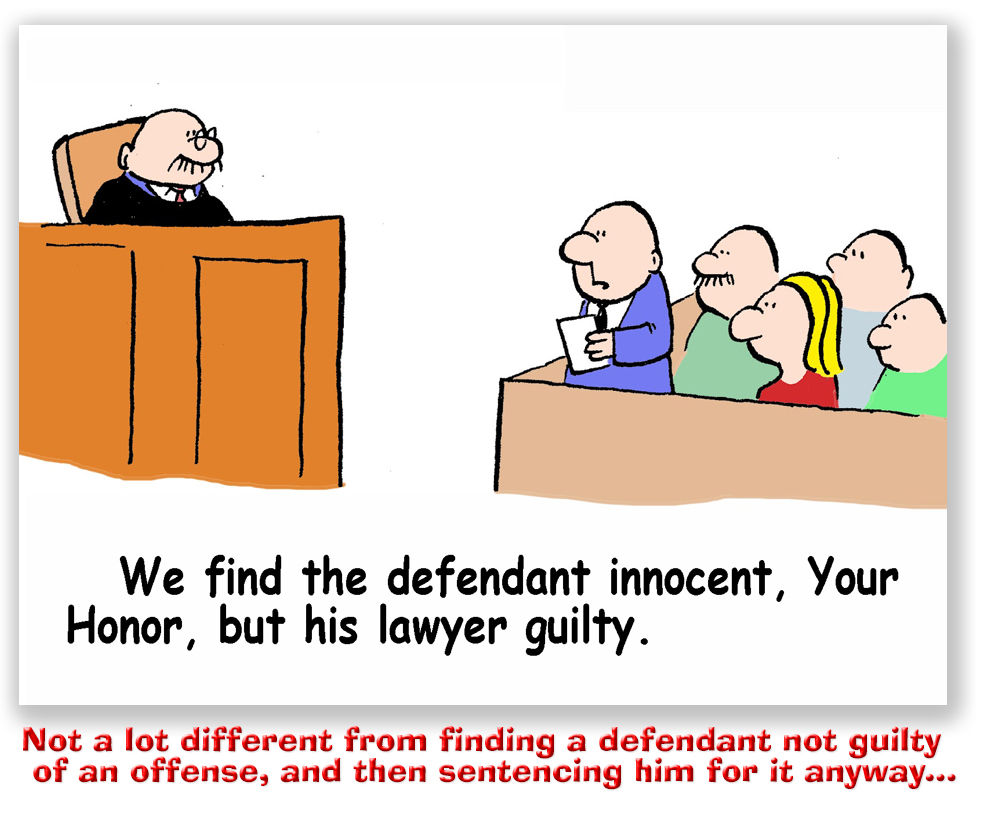We post news and comment on federal criminal justice issues, focused primarily on trial and post-conviction matters, legislative initiatives, and sentencing issues.

SCOTUS DENIAL OF ACQUITTED CONDUCT SENTENCING REVIEW MAKES LITTLE SENSE
As everyone knows, on June 30 the Supreme Court finally denied review to a thundering herd of petitions (13 in all) raising the constitutionality of acquitted conduct sentencing. And in so doing, the Court suggests that it’s way behind the times.
 Acquitted conduct sentencing is the practice of using a charge of which a defendant was acquitted by a jury to enhance a sentence. The lead petitioner, Dayonta McClinton, was convicted of robbing pharmacies but acquitted of killing one of his fellow robbers in an argument over sharing proceeds. Nevertheless, the judge more than tripled his sentence from a range of 57-71 months to a sentence of 228 months because the murder was “related conduct,” despite the fact a jury said the petitioner was not guilty of killing his co-conspirator.
Acquitted conduct sentencing is the practice of using a charge of which a defendant was acquitted by a jury to enhance a sentence. The lead petitioner, Dayonta McClinton, was convicted of robbing pharmacies but acquitted of killing one of his fellow robbers in an argument over sharing proceeds. Nevertheless, the judge more than tripled his sentence from a range of 57-71 months to a sentence of 228 months because the murder was “related conduct,” despite the fact a jury said the petitioner was not guilty of killing his co-conspirator.
A careful reading of the statements issued by some Justice on the denial adds equivocation to five months of evasion.
When the Supreme Court denied review, Justice Sotomayor dissented and several other Justices issued statements. Last week, in his Sentencing Policy and the Law blog, Ohio State University law professor Doug Berman wrote at length about the denial of review. “It is quite obvious that objections to the use of acquitted conduct at sentencing raise constitutional issues,” he said. The certiorari petition filed by Dayonta McClinton makes this clear in its Question Presented: “Whether the Fifth and Sixth Amendments prohibit a federal court from basing a criminal defendant’s sentence on conduct for which a jury has acquitted the defendant…’ These rights are, as the Court put it in Apprendi, “constitutional protections of surpassing importance” because they define restraints on state powers and processes to impose criminal punishments.”
The statements of Justices Kavanaugh, Gorsuch and Barrett suggested these Justices voted against granting certiorari because the Sentencing Commission was considering new guidelines for acquitted-conduct sentencing. Justice Kavanaugh wrote that it is “appropriate for this Court to wait for the Sentencing Commission’s determination before the Court decides whether to grant certiorari in a case involving the use of acquitted conduct.” But as Berman observes, Kavanaugh
does not explain why it is ‘appropriate’ to leave unresolved a constitutional issue while a federal agency might address a policy issue… The Justices’ statements referencing the USSC do not account in any way for how any ‘Sentencing Commission determination’ would have any impact on the Court’s consideration of ‘constitutional protections of surpassing importance.’
Policy is policy, but constitutionality is fundamental. As Berman notes, whether acquitted conduct sentencing is constitutional has nothing to do with whether the USSC thinks that it makes policy sense to permit acquitted conduct sentencing. Obviously, the USSC once thought so (given that USSG § 1B1.3 relevant conduct sentencing has been a fixture of federal sentencing since 1988). As Berman put it, “How the USSC (or Congress) might choose to regulate sentencing law and process would not and could not resolve the array of constitutional concerns that the Supreme Court was asked to consider in McClinton. Indeed, the USSC and Congress cannot even know the full reach and limits of their powers to set forth rules concerning acquitted-conduct sentencing with constitutional matters unresolved.”
Besides, the USSC and Congress can only speak to acquitted conduct sentencing at federal sentencing, even though over 90% of sentences are handed down by state courts.
 Berman cites another problem with the Supreme Court’s punt on acquitted conduct sentencing. Justice Sotomayor’s dissent says that “the Sentencing Commission, which is responsible for the Sentencing Guidelines, has announced that it will resolve questions around acquitted conduct sentencing in the coming year.” The Kavanaugh, Gorsuch and Barrett statement says, “The Sentencing Commission is currently considering the issue.”
Berman cites another problem with the Supreme Court’s punt on acquitted conduct sentencing. Justice Sotomayor’s dissent says that “the Sentencing Commission, which is responsible for the Sentencing Guidelines, has announced that it will resolve questions around acquitted conduct sentencing in the coming year.” The Kavanaugh, Gorsuch and Barrett statement says, “The Sentencing Commission is currently considering the issue.”
Neither is correct.
Berman suspects that Sotomayor’s dissent and Kavanaugh’s statement were written months ago, before the Sentencing Commission – which proposed an acquitted conduct sentencing amendment in January – withdrew its acquitted conduct sentencing proposal for further study on April 5th. What’s more, when the Commission released its proposed 2024 amendment cycle priorities last month, acquitted conduct sentencing was conspicuously absent.
“It no longer seems to be accurate to state that the Commission ‘has announced that it will resolve questions around acquitted-conduct sentencing in the coming year’” or that it is currently considering the issue, Berman wrote last week.
The Supremes seem to expect the USSC to assume the burden. The USSC, which is ill-equipped to do so, expects SCOTUS to do its job. Expect nothing from either body on acquitted conduct sentencing: you won’t be disappointed.
Sentencing Law and Policy, Inartful dodgers: constitutional concerns with acquitted conduct that only SCOTUS can address (July 4, 2023)
Sentencing Law and Policy, Inartful dodgers: did the Justices write cert denial statements in the acquitted conduct cases months ago? (July 5, 2023)
– Thomas L. Root

